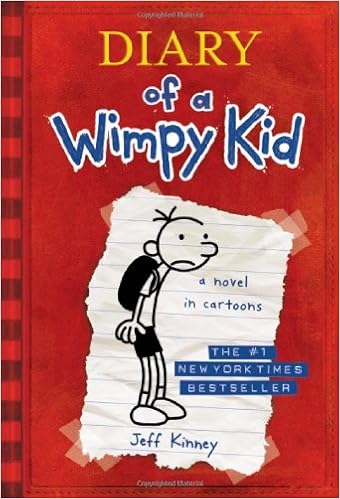 Jeff Kinney's Diary of a Wimpy Kid is nothing more than the days in the life of his main character, Greg. There's no real plot to speak of. Only Greg's day-to-day interactions, including minor conflicts that pop up and are resolved in a matter of pages, only for something new to come up. And yet, the descriptions of these conflicts and events, told with the aid of simple, yet unique, drawings, are very entertaining. Kinney writes with a dry, flat tone and simple style that make his jokes somehow funnier, and the drawings, too, are incredibly entertaining. There is not one dull page in this 200+ page first book, and in spite of myself I want to read more.
Jeff Kinney's Diary of a Wimpy Kid is nothing more than the days in the life of his main character, Greg. There's no real plot to speak of. Only Greg's day-to-day interactions, including minor conflicts that pop up and are resolved in a matter of pages, only for something new to come up. And yet, the descriptions of these conflicts and events, told with the aid of simple, yet unique, drawings, are very entertaining. Kinney writes with a dry, flat tone and simple style that make his jokes somehow funnier, and the drawings, too, are incredibly entertaining. There is not one dull page in this 200+ page first book, and in spite of myself I want to read more.I think part of the appeal of these books is that they are not patronizing. Kinney is not trying to teach a lesson. He is merely trying to entertain. There is no big message, and yet it is filled with thematic value. Through Greg, Kinney has things to say about family, school, friendship, boredom, and just every day life, especially the life of a teenage boy, and it all feels real - it all feels like something that anyone can relate to. And it's refreshing that Kinney's tone lacks any cynicism or the sulkiness of many young adult books. Kinney portrays the negatives of life with a comedic silliness, as if to laugh off those little nuisances that a teenager like Greg might take seriously. It's nice when a book makes you feel like you can connect with the characters, feel that you're not alone, and then makes you realize that there are some things we shouldn't take so seriously about ourselves. Kinney does that here.
The comedy works largely because Kinney does not stray from his flat characters. There are no sudden changes in character, no moment when they suddenly realize they were wrong. Because, let's face it, people rarely realize or admit when they are wrong. And that's what makes Greg such a great character, though he doesn't have a whole lot of depth. Kinney portrays him as a self-centered teenager without disparaging said teenager. We can laugh at Greg's mistaken perspective as a flaw in his person and as a flaw in many young people (and sometimes not so young). For example, when Greg's grandmother's house is toilet papered, partly due to Greg's actions, he feels bad but decides that she probably doesn't mind because she's retired and has a lot of time on her hands anyway. Greg's logic makes sense, but a wise reader will realize that, retired or not, nobody wants to clean toilet paper off their home.
As funny as Greg's perspective is, the supporting characters help out a lot as well. Rowley, his best friend, the one Greg is embarrassed to admit as his best friend, is reliably nerdy, either taking things too seriously, or unable to control his laughter over childish jokes. Rodrick, Greg's older brother, is reliably rebellious. Manny, Greg's younger brother, always calls Greg "Bubby," a name he doesn't want his friends knowing, and also always gets whatever he wants, just like the youngest generally seems to. There is also Greg's mom, whose purpose in life is to embarrass her children, and Greg's father, who is pleased when Greg decides he wants to take up weightlifting. And this is but a small assortment of the many characters who make their way through this story. Everyone meanders into Greg's life, and his diary, occasionally and leave without explanation only to return again. And in the end it all feels just right.
No comments:
Post a Comment